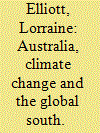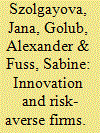| Srl | Item |
| 1 |
ID:
108149


|
|
|
|
|
| Publication |
2011.
|
| Summary/Abstract |
Australia's climate change relationship with developing countries is framed by the 1992 United Nations Framework Convention on Climate Change and the 1997 Kyoto Protocol. Under those agreements, Australia has committed to take a lead in cutting greenhouse gas emissions and to provide technological and financial support to developing countries. In practice, Australian governments of both political hues have adopted a somewhat ambiguous and ambivalent attitude to developing countries within climate change politics and their fulfilment of those commitments has been uneven. This is particularly so if the concept of the 'Global South' is expanded from developing countries to include those people who are vulnerable to the environmental, social and economic impacts of climate change.
|
|
|
|
|
|
|
|
|
|
|
|
|
|
|
|
| 2 |
ID:
132829


|
|
|
|
|
| Publication |
2014.
|
| Summary/Abstract |
In a regulated world where government seeks to decarbonize the energy sector, firms face both indirect and direct costs of emitting CO2. This study seeks to take the perspective of the firm, which needs to maximize profits implying minimization of (carbon) cost as well. In this study, the firm can compose the cost-optimal portfolio of (a) investing into carbon-saving technology, which is currently expensive, (b) investing into carbon-saving technology R&D and adopt this technology at a later point, (c) buying allowances per ton of emitted CO2 in a carbon market (alternatively this could be formulated as a tax), and (d) buying offsets traded in the same market, which are based on reduced emissions from deforestation and degradation (REDD+). Uncertainties in the cost of carbon coming from a lack of commitment in policy-making leading to fluctuations in markets and uncertainty in the payoff of R&D activities could provide disincentives to incur large up-front sunk cost and raise the economic value of being flexible. We apply a real options approach with stochastic carbon-saving technology costs and stochastic CO2 costs. Assuming that firms are risk-averse, they will not only value flexibility, but also risk reductions from diversification over the different (carbon mitigation) options.
|
|
|
|
|
|
|
|
|
|
|
|
|
|
|
|